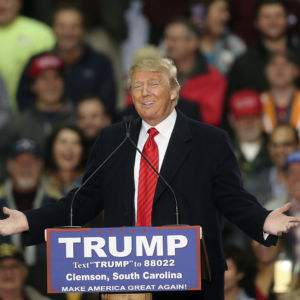Trade policy is teed up to be a major issue in the presidential campaign, though not in the ways anyone could have anticipated a few years ago. But to people who have watched the last 20 years of the Republican politics of trade, it’s one of those developments that seemed inevitable, but whose timing was impossible to predict. Who would have thought that a New York real estate developer would have busted the party open on trade?
Donald Trump, now the presumptive Republican nominee, is bound to make an issue of it. Sure, Hillary Clinton opposes the Trans-Pacific Partnership, the 12-nation trade agreement that President Barack Obama negotiated. But as secretary of state, Clinton promoted it. And the other Clinton — Bill — has fingerprints all over a raft of trade deals. Does anyone seriously think it won’t be a Trump talking point in a general election?
Glib interpretations of the politics of trade for the last 20 years have pinned the controversy on the rise of “protectionism” — which has become a vague political epithet rather than a useful label — in a Democratic Party where labor unions wield considerable influence. And there is no question that they changed the Democratic dynamics on trade.
Their issue has been simple: trade agreements cost jobs. It’s a debatable point, since offshoring has been a fact of American economic life since the 1960s. Severe recessions in countries with which the United States trades squeezes cyclical employment in export industries far more than trade agreements. Nevertheless, labor adamantly opposes new trade deals, and none more vociferously than the one with China in 2000.
The simmering reality of Republican politics on trade: since the mid-1990s, they’ve been a bottle with the cork in too tight over trade.
The Republican leadership in Washington, from Newt Gingrich and Denny Hastert to John Boehner and Paul Ryan never wavered in their support for deals like the North American Free Trade Agreement, the Uruguay Round that created the World Trade Organization and, above all, a landmark pact with China that Bill Clinton pushed through in 2000.
Beneath the surface, core Republican constituencies seethed at its leadership.
They had a few champions in Congress. Rep. Chris Smith of New Jersey never stopped talking about human rights in China, with a particular focus on persecuted Christians. Former Sen. Fred Thompson of Tennessee hammered away at security issues like China’s proliferation of weapons technology. The late Rep. Charlie Norwood of Georgia, in a final speech raging against the China deal, called on lawmakers to demonstrate that “liberty shines brighter than gold.”
And, contrary to every shred of conventional wisdom about where you might find a union lobbyist, some Republicans, like Rep. Duncan Hunter of California, maintained cordial relationships with labor.
But those champions never organized themselves around the issue the way they might abortion or Obamacare or any of the other issues that really animate Republican voters. Republican opponents of free trade never had the kind of people who coordinated lobbying, took names, and built bridges with undecided lawmakers. In short, though they had a lot of voters with them, they didn’t have a Washington organization.
By contrast, establishment Republicans had the business lobby on their side — led by multinationals like Caterpillar, IBM, and General Electric — and rightly conveyed the impression of having a well-oiled machine that could roll out and crush congressional opposition to new trade deals. Wavering Republican members of Congress — or ones who simply wanted the issue to go away — found themselves under pressure from local businesses, and enjoyed fundraising largesse in Washington.
Flash forward to 2016, and the craziness that is the Republican presidential primary. Front-runner Donald Trump has embraced a neo-isolationist foreign policy that rejects free-trade agreements and calls for a wall of tariffs against Mexican and Chinese imports. These would have been entirely common Republican ideas 100 years ago but then it would have been at the behest of business looking to keep competitors out, not laborers worried about low-wage competition.
Tony Fratto, a former official of the George W. Bush administration who now runs a public relations firm that counts key corporate lobby groups as clients, told The Wall Street Journal that, “In some ways, the Republican Party is becoming like the traditional Democratic Party” in its opposition to free trade.
But Fratto’s point is only half correct. The Republican Party was always much more like the Democrats than its leadership cared to admit, but the tendencies were masked by partisan rancor and a lack of an effective spokesman or organized apparatus in Washington.
In short, Trump provided in spades what Republican opponents of free trade were lacking for so long: leadership. And even if he loses the Republican nomination or the general election, Trump has pried the cork out of the bottle with relatively little effort. Putting it back in, if that’s even possible, won’t come easily.

